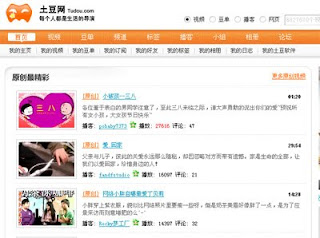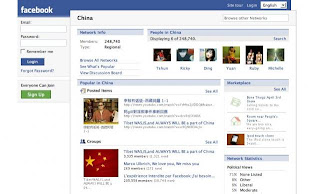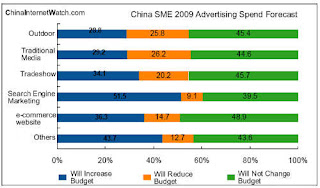
Saturday, December 5, 2009
The Renaissaince Site

Thursday, December 3, 2009
A Co-Branded Fan...is a Synonymous Fan : )


and the type of consumer they attract. Tudou.com has been quite successful with the image they project to their site users, and has gone one step further to ensure a larger audience. Tudou does a thing called "co-branding" in which it presents products, services, or artists along with the producing companies. An example of this is co-branding artist with music labels, one of the most popular being songstress "Guo Meimei presented by Warner Music and Tudou." Tudou provided Warner Music/Guo Meimei their own music homepage which got 6,000,000 page visits in the first 2 weeks of creation. This type of relationship between companies and Tudou allows Tudou to gain more diverse video users who could potentially become regular Tudou site users. Also, once these new site users become accustomed to using Tudou to watch their favorite Warner Music artists, the two names, Tudou and Warner Music become synonymous brands to the consumer = a Co-branded Fan...is a Synonymous Fan : )
Tuesday, December 1, 2009
Demographically speaking...

Saturday, November 28, 2009
Tudou Collabo???

Thursday, November 19, 2009
Tudou the Tiger
 According to Chinese zodiac, 2010 is the year of the Tiger and also the year Tudou expects to break even. The Tiger is characterized as an adventurous leader and risk-taking animal, and I think that is an accurate description of Tudou's chosen business ventures. "Tudou announced it will invest 100 million yuan (US$14.75 million) in content and expects to break-even next year, thanks to the booming advertising income and expanded mobile business" (ShanghaiDaily.com). Tudou will probably be the first online video-uploading site to turn a profit in the highly competitive Chinese video market.
According to Chinese zodiac, 2010 is the year of the Tiger and also the year Tudou expects to break even. The Tiger is characterized as an adventurous leader and risk-taking animal, and I think that is an accurate description of Tudou's chosen business ventures. "Tudou announced it will invest 100 million yuan (US$14.75 million) in content and expects to break-even next year, thanks to the booming advertising income and expanded mobile business" (ShanghaiDaily.com). Tudou will probably be the first online video-uploading site to turn a profit in the highly competitive Chinese video market.
Wednesday, November 18, 2009
Chinese Internetional Relations
40:35
Thursday, November 12, 2009
Bandwidth Bandit

Tudou.com, similar to television, has gone "HD" in attempts to make their video content clearer, crisper, and easier on the eyes. However, Tudou, as a video uploading site has gone one step further to better the experience for their online video viewers by changing bandwidth formats. For those of you who don't know what bandwidth is, basically, video bandwidth is a monitor's ability to refresh a computer screen, and high bandwidths allow more information to be shown across a display in a given amount of time, which translates into support for higher resolutions and greater refresh rates (CNET.com). Tudou "will migrate from Sorenson Spark format to On2 VP6 as their default codec [to] create Adobe Flash content. In addition, Tudou will standardize on the On2 Flix Engine software to encode all incoming videos to the site"(Reuters.com).
This switch delivers a greater amount of bandwidth savings, requires less computing power to replay, and avoids potentially expensive MPEG-LA licensing obligations. Micheal Zhao, the Chief Technology Officer at Tudou said, "[s]witching from Sorenson Spark to On2 VP6 we estimate a reduction in our bandwidth overhead of up to 40%, without lowering the quality of our published videos. The encoding speed of On2 Flix Engine also enables a greater throughput for video transcoding" (Reuters.com)). Tudou understands the importance of adapting and evolving in an Internet environment that is constantly changing technologically. With better video quality, efficiency, and speed, Tudou will attract more consumers and increase video and ad space...Bandwidth Bandits!!!
Tuesday, November 10, 2009
Our Own Ownership


As previously discussed in my posts, Tudou.com is increasing in size, wealth, video-consumers, and maybe most importantly, content. With mergers like Tudou-China Mobile, an expanding broadband width, and addition of advertiser platforms, the next endeavor Tudou will embark on is becoming "the Content King" of Chinese video uploading sites. Anita Huang, the VP of community and marketing at Tudou said, "[w]e will still work with the mainstream entertainment provider partners to buy their content and work on revenue sharing models with our partners, but we are expanding our footage to more co-production and joint-funding productions with other entertainment partners" (Media.asia).
Tudou has begun producing original content including a TMZ reminiscent entertainment news show and a “Who Wants to Be a Millionaire?” reminiscent reality show it co-produced with Noki. As just mentioned, Tudou has partnered up with another media giant, Nokia [a telecommunications, Internet, and computer software company based in Finland] for production purposes. "The Nokia show cost some $500,000 in US dollars to produce and thirty million [viewers] tuned in for the six live shows, where contestants could use friends or search engines on their Nokia N97s to help get the answers" (TechCrunch.com).
Tudou-Nokia exemplifies blatant product placement, advertisement, and profitability along with strategic marketing, and a foundation for creating Tudou in house productions. By creating their own content, Tudou will increase their credibility in the online video-uploading world and stream revenues into their own pockets from advertisers who decide to purchase ad space during their shows = Our Own Ownership...
Thursday, November 5, 2009
"Hello, this is Tudou calling, may I speak with China Mobile please?"


Youtube.com isn't the only one partnering up with media giants! As we mentioned in class, it is becoming increasingly popular for online media giants to partner up with each other in hopes of attracting more users, making their services more convenient, and adding unique features to their sites. An example of this is Facebook using email to update and alert Facebook users, and the sites we're simultaneously using now, Blogger.com and Gmail. This "partnering" strategy seems to be smart and profitable for both parties involved as it increases user presence and usually adds features to both sites. Tudou has recently taken this route as it partnered up with China Mobile which is one of the largest cell phone services in China.
According to ShanghaiDaily.com, "Tudou has signed with China Mobile to launch video content on handset[s] for more than 700 million Chinese mobile phone users." This combination is genius, as it not only allows Chinese China Mobile cellphone users, and Chinese Tudou video users to easily access Tudou's video uploading features on their mobile devices, but also, with the "video" feature on many cell phones (that allows cell phone users to record video footage at any moment) to instantaneously upload video footage, therefore increasing the video uploading and viewing traffic on Tudou. This will have a beneficial impact on Tudou's website user presence and profitability of their advertising space. A simple, yet effective conversation...
Tuesday, November 3, 2009
Tudou.com: $ubdomain$

Upon further exploration of Tudou.com I discovered something it has that it's American counter-part Youtube.com does not explicitly offer; multiple models of $ubdomain$. While Youtube is moving in this direction with its Youtube.com/movies that allows users to watch select full length movies (from what I gauge to be older and unpopular films) categorized by genre and their Youtube.com/music that allows users to watch full length music videos categorized by genre that have been uploaded by other users (predominately music companies themselves), it has not mastered subdomains as creatively as Tudou. Tudou not only offers content of specific topics on their website, but goes as far as to allow each topic, such as gender, sports, music, education, cartoons, video games, "channels," and high-definition footage its own subdomain website page. This allows advertisers to narrow their advertisements to a more specific area of the vast video uploading site, while also reaching a broad enough audience to effectively reach targeted groups. This new super categorization reflects a similar dilemma that TV advertisers face: whether to purchase ad time on more specific and narrowed T.V network shows or on shows that attract more diverse and fragmented audiences. O what tudou what tudou : )
Tuesday, October 27, 2009
IntEnablEvision cont...
The combination of the Internet and T.V as IntEnablEvision in China is now feeling the heat as television watchers are literally able to watch pirated media (TV shows, films, etc...) on television in the comfort of their own homes. There have been many lawsuits against the Internet-Enabled T.V manufacturer, Haier such as, "Chinese online video content provider NetMovie.com [that] plans to file a copyright infringement lawsuit against Haier and three other major Chinese vendors selling Internet TVs, Changhong, TCL and Hisense. Online film distributor Union Voole Technology has filed a separate suit against TCL, the company that manufactures these Internet-Enabled T.Vs because of piracy" (Pcworld.com). Because this media is so new, restrictions have yet to be determined and lawfully written, but it will be interesting to see what measures Chinese government takes to govern this unity...till ban do they part
Also, check out a video talking about a new IntEnablEvision-like product Sony has introduced
Monday, October 26, 2009
World Expo... Meet the Internet!
CHINESE INTERNET: Tudou.copyRight or copyWrong? cont...
Thursday, October 22, 2009
CHINESE INTERNET: Saving Face by blocking Facebook

As noted above, two of the most powerful abilities for the Chinese Facebook users are international communication and voiced opinion. Both of these abilities are threatening to a strict and "dictative" Chinese government that acts as a doorkeeper between its citizens and the outside world. When controversial events take place, such as, the riots in the western region of Xinjiang, China and Olympics protest, Chinese government tends to tighten the reigns on social networking sites that they don't control, and that have potential to leak "confidential" Chinese happenings to the "outside" world. This is currently posing a problem for sites like Twitter and Facebook.
A point that I will bring back up, is the difference between international appeal and limited local appeal. Unlike other networking sites that only cater to a predominately one language speaking audience, Facebook has become a somewhat international website because it is an English (western) based site. The Chinese government restrictions have serious potential to cripple Facebook's future profits, as China is an unsaturated market looking for and craving Facebook's capabilities, games, applications, and interactive capabilities...Facebook has to stratgeize and find ways to succesfully maintain in the Chinese market, especially with competition from websites such as Zhanzuo.com...A comparison on these two sites coming soon...
Wednesday, October 21, 2009
CHINESE INTERNET: Tudou.copyRight or copyWrong? cont...

Monday, October 19, 2009
CHINESE INTERNET: Tudou.copyRight or copyWrong?



Thursday, October 15, 2009
CHINESE INTERNET: IntEnablEvision

- There are 400 million household TV sets in China, with 1.3 billion TV viewers.
- There are 160 million cable TV households in China, with 30 million digital TV users expected by the end of 2007.
- More than 70 million fixed broadband subscribers currently exist in China, and there are more than 250 million Internet users.
Wednesday, October 14, 2009
CHINESE INTERNET: Standardized Regulation

In my "Chinese Internet: Page Not Found" we explore the Chinese government's extreme measures to censor Chinese Internet users online content access. The social implications of the proposed pre-installation of the Green Dam Youth Escort software were discussed, but now let us take a look at another new type of filter that will potentially affect Chinese Internet business models. The Search Engine Marketing Standard and Regulation was initiated just last month (September) 2009 by three major players in Chinese Internet: the Internet Society of China, China Communication Standards Associations, and Baidu. This new system "represents a new development stage within the Internet search engine marketing sector in China. SEM "provides definitions for industrial terms of search engine marketing as well as the reference regulations and the procedures to be followed for this business. It gives authoritative and universal explanations for definitions and knowledge involved in SEM and helps enterprises learn about the various links for SEM." Also, it gives insight into how the sector could potentially evolve in the future and focuses on "granting SEM scope of business activities to dually licensed SEM advertising agencies rather than the current hordes of companies who use simpler consulting business licenses to provide SEM services."
Wednesday, October 7, 2009
CHINESE INTERNET: Page Not Found
In China, when the message "Page Not Found" pops up after an online engine or URL entry search, chances are it is not an "Error." Unlike the United States, China's Internet has become increasingly subject to censorship. Many methods such as, self-censorship have been implemented in hopes of limiting the amount of attained forbidden web material by creating regulations that outlaw access to certain online content, and speech against Chinese government. The repercussions for attempting these illegal content searches are punishable by imprisonment, and have led to even greater consequences. The Chinese government is going to new extremes to ensure its Internet users are UNable to access "inapPROPriate" or "politically sensitive" conTENT. Up to this point, Chinese government has used online filters in order to restrict Chinese Internet users, but now it has implemented new technology methods to ensure censorSHIP. Green Dam Youth Escort SOFTware " AUTOmatically downloads the latest updates of a list of [government proclaimed] prohibited sites from an online database, and also collects private user data." It is not the fUNCTION of this software that is controversial, but instead, it's potential required installation on every computer in China. The tentative law to mandate all computers to come with this software pre-installed would not allow Chinese Internet users the option to choose whether or not they were subject to complete government censorship. Because of restrictions on search engines and websites, many Internet users have opted to join social networking websites that allow them to create new identities and voice their opinions without worrying about being judged harshly, or worse, being "identified.” However, government plans to require all internet users to enter their real identification information take away a major attraction of the Internet, especially social networking sites, and chat rooms; anonymity. As we can see, the social implications of China's Internet censorship are numerous, but now let us take a look at how it affects China's business model.
While I studied abroad in Shanghai, China last year, I began to analyze the Chinese government's relationship to Chinese's Internet users; I compared it to a parent - child relationship. The Chinese government represents the parent that guides the child, and acts as a doorkeeper between the child and the outside world. On the other hand, the child is dependent on the parent for knowledge, and as it grows older and is exposed to consumer society, asks the parent to purchase, purchase, purchase! Many projections place China as the forerunner as the world and Asia's largest consumer market. The Chinese consumer market is far from saturation; companies see the potential that lies within this market, and constantly try to figure out how to effectively reach the Chinese consumers. The Internet is probably the one tool that is capable of reaching the large and diverse population of "consumer savvy" Chinese. Now, when I say consumer savvy Chinese, that probably excludes a number of Chinese that do not have internet/computer access and those in rural areas, but even they are increasingly susceptible to the Internet's bombardment. American companies such as Microsoft, Yahoo! and Google are only three players in China's Internet infrastructure, and like other companies, they have fallen under scrutiny to conform to Chinese societal standards and appease the Chinese government. In the next blog we will further explore the effects and structural changes that foreign Internet companies endure when entering China’s online world.
Another fellow blogger with a recent update on the Green Dam Youth Escort mandate: http://mashable.com/2009/07/01/china-green-dam-celebration/
Guardian.co.uk explanation of the Green Dam Youth Escort Mandate: http://www.guardian.co.uk/world/audio/2009/jul/01/china-internet-green-dam-censorship
China predictions: http://www.thaindian.com/newsportal/india-news/china-to-become-worlds-second-largest-consumer-market-by-2015_1002069.html
Thursday, October 1, 2009
Third World Internet Social and Business Models
Thursday, September 24, 2009
Social Representation in the Media
